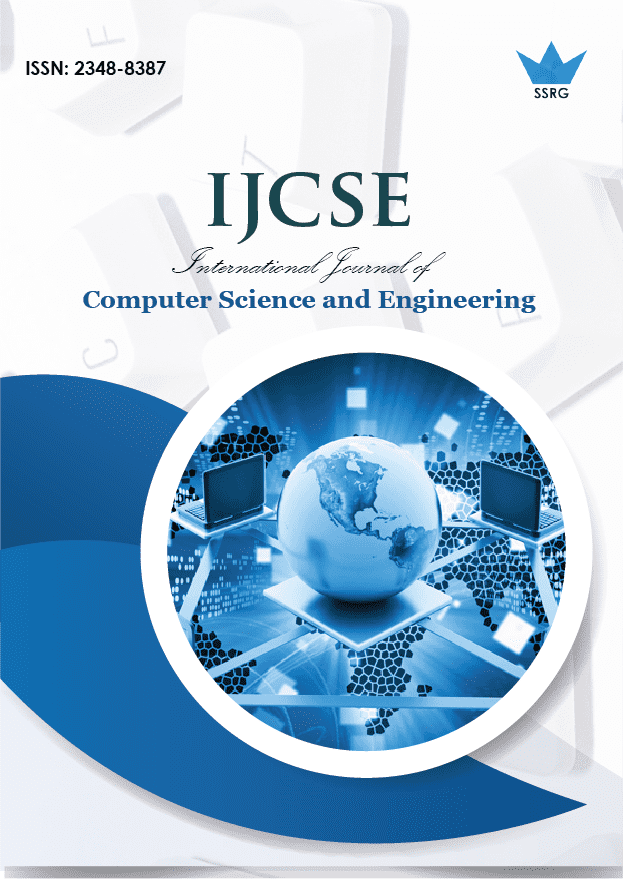An Efficient Cluster based Searching Process for finding Keyword Query Related Documents

| International Journal of Computer Science and Engineering |
| © 2018 by SSRG - IJCSE Journal |
| Volume 5 Issue 2 |
| Year of Publication : 2018 |
| Authors : Putchakayala Mahesh Reddy, Mula Sudhakar |
How to Cite?
Putchakayala Mahesh Reddy, Mula Sudhakar, "An Efficient Cluster based Searching Process for finding Keyword Query Related Documents," SSRG International Journal of Computer Science and Engineering , vol. 5, no. 2, pp. 1-4, 2018. Crossref, https://doi.org/10.14445/23488387/IJCSE-V5I2P101
Abstract:
Now a day’s to analyse an efficient query related document has not been work the difficulties of queries over database. So many researches are proposed many methods for predicting query related text documents. By implementing these techniques are not given an efficient keyword query related documents. By overcome those types of problems we are implementing a keyword query related interface is used to assign each query term to schema element in the database. So that the test result type must be desired and also get query related text documents. Some of the existing methods are not empirical to show direct adaptation of ineffective for structured data. By overcome those problems in this paper we are proposed an efficient keyword query related process for getting efficient search result. By implementing efficient keyword query related process we can perform the best search process on a text documents. In the efficient keyword query related process mainly contains four concepts i.e. text pre-processing, build mvs matrix, clustering of text document and performing searching process. By implementing those concepts we can get the efficient query related text document.
Keywords:
Searching techniques, Prediction, Keyword, query, K Means Clustering Algorithm, Distance, Frequency, Local Frequency, global Frequency.
References:
[1] Voorhees, E.M.: Overview of the TREC, robust retrieval track. In: The Fourteenth Text REtrieval Conference (TREC 2005), Gaithersburg, MD, 2006. National Institute of Standards and Technology Special Publication 500-266 (2005).
[2] Harman, D., Buckley, C.: The NRRC reliable information access (RIA) workshop. In: Proceedings of the ACM SIGIR International Conference on Research and Development in Information Retrieval, Sheffield, United Kingdom, pp. 528–529 (2004).
[3] Carmel, D., Yom-Tov, E., Soboroff, I.: SIGIR workshop report: predicting query difficulty - methods and applications. SIGIR Forum 39(2), 25–28 (2005).
[4] Zobel, J., Moffat, A.: Inverted files for text search engines. ACM Computing Surveys 38(2) (2006).
[5] He, B., Ounis, I.: Query performance prediction. Information System 31(7), 585–594 (2006).
[6] Scholer, F., Williams, H.E., Turpin, A.: Query association surrogates for web search. Journal of the American Society for Information Science and Technology 55(7), 637–650 (2004).
[7] Cronen-Townsend, S., Zhou, Y., Croft, W.B.: Predicting query performance. In: Proceedings of the ACM SIGIR International Conference on Research and Development in Information Retrieval, Tampere, Finland, pp. 299–306 (2005).
[8] Zhou, Y., Croft, W.B.: Query performance prediction in web search environments. In: Proceedings of the ACM SIGIR International Conference on Research and Development in Information Retrieval, Amsterdam, The Netherlands, pp. 543–550 (2007).
[9] Kwok, K.L.: An attempt to identify weakest and strongest queries. In: Predicting Query Difficulty, SIGIR 2005 Workshop (2005).
[10] Zhou, Y., Croft, W.B.: Ranking robustness: a novel framework to predict query performance. In: Proceedings of the ACM SIGIR International Conference on Research and Development in Information Retrieval, Arlington, Virginia, pp. 567–574 (2006).

 10.14445/23488387/IJCSE-V5I2P101
10.14445/23488387/IJCSE-V5I2P101